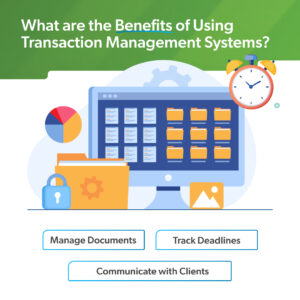
Managing multiple transactions, documents, and client communications can be a challenge for real estate professionals. A real estate transaction management platform offers a solution by simplifying these tasks and centralizing your workflow. By automating routine tasks and providing easy access to important documents, these platforms can help reduce errors, save time, and improve collaboration. In this article, we’ll explore the key benefits of using a real estate transaction management platform and how it can streamline your business operations.
What is a Real Estate Transaction Management System?
A real estate transaction management system is a digital platform designed to help real estate professionals manage the entire transaction process, from listing to closing. It centralizes tasks such as document storage, communication, task tracking, and digital signatures, all in one place. These systems streamline workflows, reduce manual errors, and ensure the timely completion of key tasks, which ultimately improves efficiency and organization for brokers and agents.
What are the Benefits of Using Transaction Management Systems?
Transaction management systems help real estate professionals stay organized and operate more efficiently. They provide a centralized space to manage documents, track deadlines, and communicate with clients and team members. By automating routine tasks, these systems reduce administrative workload and minimize the chance of errors. Overall, they create a more seamless transaction process, ensuring that deals move forward smoothly and saving valuable time for brokers and agents.
Centralizing Document Storage and Access
Centralizing document storage in a transaction management system ensures all important files are organized and easily accessible in one place. This eliminates the need for scattered paperwork or multiple systems, making it faster to locate contracts, disclosures, and other essential documents. It also improves collaboration, as team members and clients can access files anytime, from anywhere.
Reducing Manual Errors
Manual errors, such as missing signatures or incorrect information, can slow down transactions and cause delays. A transaction management system helps minimize these risks by automating data entry, ensuring accuracy in documents, and providing built-in checks. This reduces the likelihood of costly mistakes and improves the overall quality and efficiency of real estate transactions.
Enhancing Team Collaboration
Transaction management systems improve team collaboration by providing a centralized platform where team members can access, share, and update documents in real-time. This eliminates the confusion of multiple versions and ensures everyone is on the same page. Enhanced collaboration helps streamline communication, speeds up decision-making, and creates a more efficient workflow.
Improving Transaction Speed
By automating tasks, tracking deadlines, and centralizing document management, transaction management systems help speed up the closing process. With less time spent on manual tasks, documents can be signed and processed faster. This accelerates the overall transaction timeline, allowing deals to close more quickly and efficiently, benefiting both clients and agents.
Increasing Client Satisfaction
Transaction management systems help increase client satisfaction by offering transparency and real-time updates throughout the process. Clients can easily access documents, track the progress of their transactions, and communicate with their agents, leading to smoother, more efficient experiences. Faster closings and clear communication improve trust, resulting in happier and more loyal clients.
Tracking Deadlines and Milestones
A transaction management system helps real estate professionals track deadlines and important milestones by providing automated reminders and notifications. This ensures critical tasks such as inspections, appraisals, and closings are completed on time. Staying on top of deadlines helps avoid delays, keeps the transaction on track, and ensures smooth progress from start to finish.
Ensuring Compliance and Data Security
Transaction management systems ensure compliance by automatically tracking required documents and deadlines while providing secure storage for sensitive client data. With built-in features to meet industry regulations, these platforms reduce the risk of legal issues and data breaches. Strong encryption and security protocols also protect client information, further ensuring trust and reliability throughout the transaction process.
Reducing Administrative Workload
By automating routine tasks such as document management, reminders, and follow-ups, transaction management systems reduce the administrative workload for real estate professionals. With less time spent on paperwork and manual processes, brokers and agents can focus more on client service and closing deals. This increased efficiency leads to a more productive and organized workflow.
Challenges Without a Transaction Management System
Operating without a real estate transaction management system can lead to several challenges for agents and brokers. Manually managing multiple transactions increases the risk of disorganization, missed deadlines, and communication breakdowns. The workload becomes harder to manage, and the potential for errors rises. Without a centralized platform, maintaining efficiency, accuracy, and seamless collaboration can be extremely difficult.
Increased Risk of Human Errors
Without a transaction management system, manually handling multiple documents and tasks increases the likelihood of human errors, such as missing signatures, incomplete forms, or incorrect data. These mistakes can delay transactions, complicate the process, and potentially result in costly legal issues, making accuracy a significant challenge.
 Delays in Document Approvals
Delays in Document Approvals
Manual document handling often leads to delays in getting contracts and forms approved. Waiting for physical signatures or coordinating multiple parties can slow down the transaction process. A lack of real-time document access and digital signature capabilities further contributes to bottlenecks, ultimately prolonging the time it takes to close deals.
Difficulty Tracking Deadlines and Milestones
Tracking multiple deadlines and milestones across several transactions without a centralized system can be overwhelming. Important dates, such as inspection deadlines or closing dates, can be easily overlooked, resulting in delays or missed opportunities. Staying organized becomes a challenge, and the lack of timely reminders can disrupt the entire transaction process.
Inefficient Communication with Clients and Teams
Without a transaction management system, communication between agents, clients, and team members can become fragmented and inefficient. Important messages can get lost across different platforms, leading to confusion and delays. This disorganization hampers collaboration, slows down decision-making, and negatively affects the overall efficiency of the transaction process.
How Do I Pick a Transaction Management Software?
Selecting the right transaction management software is an important decision for real estate professionals. With various options available, it’s essential to understand what makes a platform effective and how it can support your workflow.
Assessing Your Business Needs
Before choosing a transaction management system, it’s important to assess your business needs. Consider the size of your team, the volume of transactions you handle, and any specific workflow challenges. Understanding these factors will help you select a platform that aligns with your day-to-day operations and addresses your unique requirements.
Evaluating Software Features
When selecting a transaction management system, carefully evaluate its features. Look for tools that streamline document handling, automate tasks, and support team collaboration. Ensure the platform has the necessary functionality to manage your transactions efficiently while offering flexibility to adapt to your business as it grows.
Ensuring User-Friendliness
A user-friendly real estate transaction management system is essential for smooth adoption and long-term success. The platform should be intuitive and easy to navigate, ensuring your team can quickly learn and use it effectively. Simple interfaces and clear instructions reduce training time and ensure the system enhances, rather than complicates, your workflow.
Considering Security and Compliance
When choosing a transaction management system, security and compliance should be top priorities. Ensure the platform provides encryption, secure storage, and access controls to protect sensitive client data. Additionally, the software should comply with industry regulations, safeguarding your business from potential legal issues and ensuring the confidentiality of transactions.
Comparing Pricing and Plans
It’s essential to compare pricing and subscription plans when selecting a transaction management system. Look for a solution that offers the features you need at a price that fits your budget. Consider any additional costs, such as user licenses or upgrades, and evaluate how the platform delivers long-term value for your business.
Looking for Customization Options
Every real estate business operates differently, so it’s important to find a transaction management system that offers customization options. Whether it’s tailoring workflows, reports, or document templates, a customizable platform allows you to adapt the software to your specific processes and preferences, ensuring it fits seamlessly into your existing operations.
Reading User Reviews and Testimonials
Before choosing a transaction management system, it’s important to read user reviews and testimonials. Real feedback from other real estate professionals can provide insights into the platform’s performance, reliability, and ease of use. These reviews help you understand potential pros and cons, enabling you to make a more informed decision.
Requesting a Software Demo
Requesting a software demo is an essential step when selecting a transaction management system. A demo allows you to explore the platform’s features, functionality, and user interface in real-time. It also provides an opportunity to ask questions, so you can make sure the system meets your specific needs before committing to a purchase.
Evaluating Customer Support and Training
Effective customer support and training are key when adopting new software. Ensure the transaction management system offers comprehensive onboarding, resources, and responsive customer service. Reliable support guarantees smooth implementation and helps your team quickly navigate any issues, maximizing the platform’s potential and ensuring long-term success for your business.
Schedule a Demo of Our Real Estate Transaction Management Platform
Experience firsthand how our real estate transaction management platform can simplify your workflow and boost efficiency. By scheduling a personalized demo, you’ll see how the platform centralizes document storage, automates tasks, and streamlines communication. Our solution is designed to save time, reduce manual errors, and help you manage transactions more effectively.
Whether you’re part of a large team or an individual agent, our platform can be tailored to meet your unique needs. Demos are available to Brokers and Association Executives looking to onboard 10+ agents, while individual agents and brokers with fewer than ten agents have access to live webinars. Contact us to schedule your demo today!




